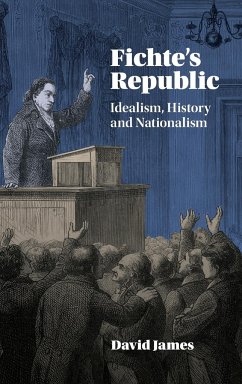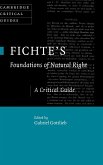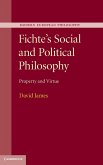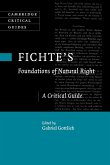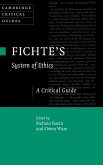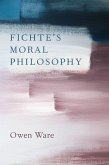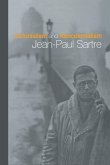David James
Fichte's Republic
David James
Fichte's Republic
- Gebundenes Buch
- Merkliste
- Auf die Merkliste
- Bewerten Bewerten
- Teilen
- Produkt teilen
- Produkterinnerung
- Produkterinnerung
An original interpretation of the connection between idealism, history and nationalism in Fichte's general philosophical, educational and moral project.
Andere Kunden interessierten sich auch für
![Fichte's Foundations of Natural Right Fichte's Foundations of Natural Right]() Fichte's Foundations of Natural Right97,99 €
Fichte's Foundations of Natural Right97,99 €![Fichte's Social and Political Philosophy Fichte's Social and Political Philosophy]() David JamesFichte's Social and Political Philosophy76,99 €
David JamesFichte's Social and Political Philosophy76,99 €![Fichte's Foundations of Natural Right Fichte's Foundations of Natural Right]() Fichte's Foundations of Natural Right32,99 €
Fichte's Foundations of Natural Right32,99 €![Fichte's System of Ethics Fichte's System of Ethics]() Fichte's System of Ethics92,99 €
Fichte's System of Ethics92,99 €![Fichte's Moral Philosophy Fichte's Moral Philosophy]() Owen WareFichte's Moral Philosophy111,99 €
Owen WareFichte's Moral Philosophy111,99 €![Republic of Korea Armed Forces Republic of Korea Armed Forces]() Republic of Korea Armed Forces42,99 €
Republic of Korea Armed Forces42,99 €![Colonialism and Neocolonialism Colonialism and Neocolonialism]() Jean-Paul SartreColonialism and Neocolonialism172,99 €
Jean-Paul SartreColonialism and Neocolonialism172,99 €-
-
-
An original interpretation of the connection between idealism, history and nationalism in Fichte's general philosophical, educational and moral project.
Produktdetails
- Produktdetails
- Verlag: Cambridge University Press
- Seitenzahl: 240
- Erscheinungstermin: 21. September 2015
- Englisch
- Abmessung: 235mm x 157mm x 18mm
- Gewicht: 504g
- ISBN-13: 9781107111189
- ISBN-10: 1107111188
- Artikelnr.: 42789652
- Herstellerkennzeichnung
- Libri GmbH
- Europaallee 1
- 36244 Bad Hersfeld
- gpsr@libri.de
- Verlag: Cambridge University Press
- Seitenzahl: 240
- Erscheinungstermin: 21. September 2015
- Englisch
- Abmessung: 235mm x 157mm x 18mm
- Gewicht: 504g
- ISBN-13: 9781107111189
- ISBN-10: 1107111188
- Artikelnr.: 42789652
- Herstellerkennzeichnung
- Libri GmbH
- Europaallee 1
- 36244 Bad Hersfeld
- gpsr@libri.de
While a student at Portsmouth Technical College, David was tempted to follow his heart and become a writer. Instead, having been brought up in a service family, duty called and he joined the Royal Navy as a seaman officer.In 1971 he left the Senior Service to pursue his other dream - of becoming a professional civilian sailor. Hard years followed before he was sufficiently experienced and qualified to captain groups of young Londoners on adventurous sailing voyages in a traditional old Norwegian sailing rescue ship. In 1977 David was recruited to run Ocean Youth Club, Britain's largest sail training fleet. In 1985 he was head-hunted by the Drake Fellowship which he soon merged with Fairbridge to create Fairbridge-Drake. This became the UK's most effective motivational training charity for unemployed young people in inner cities.David eventually left London for West Cornwall, where, at the age when most people retire, his wife suggested opening a bookshop. They transformed a local tea-room into a much-loved café and second-hand bookshop where David started writing poetry again, publishing Any Cornish Beach in 2009.David relished the solitude imposed by the Covid lockdown and began to write his first novel, A Flower in Winter.
Introduction
1. Selfhood, virtue and the Wissenschaftslehre
1.1 Fichte's critique of Rousseau
1.2 The dispute between idealism and dogmatism
1.3 Idealism and virtue
1.4 The republic of scholars
2. Practical reason, conscience and ethical vocation
2.1 The primacy of practical reason
2.2 Conscience and radical evil
2.3 Ethical vocation
3. The relation between moral subjectivity and history in Fichte's defence of the French Revolution
3.1 Moral subjectivity and history
3.2 Experience and history
4. Fichte's philosophy of history: the future ages of humanity as postulates of pure practical reason
4.1 Practical need and the end of reason
4.2 Fichte's world plan
4.3 Fichte's instrumentalization of history
5. The absolute state: coercion and perfectibility
5.1 The absolute state
5.2 From Rechtsstaat to Kulturstaat
6. Fichte's Republic
6.1 The idea of a new German university
6.2 The role of the new university in a German national education
6.3 Philosophy and the life of the nation
6.4 Love of fatherland and the moral will
6.5 The German Republic
7. The role of language in Fichte's construction of the nation
7.1 Creating the nation
7.2 Fichte's idea of an original language
7.3 The Germans as speakers of an original language
7.4 Language and the construction of the nation
7.5 Fichte and Machiavelli
Bibliography
Index.
1. Selfhood, virtue and the Wissenschaftslehre
1.1 Fichte's critique of Rousseau
1.2 The dispute between idealism and dogmatism
1.3 Idealism and virtue
1.4 The republic of scholars
2. Practical reason, conscience and ethical vocation
2.1 The primacy of practical reason
2.2 Conscience and radical evil
2.3 Ethical vocation
3. The relation between moral subjectivity and history in Fichte's defence of the French Revolution
3.1 Moral subjectivity and history
3.2 Experience and history
4. Fichte's philosophy of history: the future ages of humanity as postulates of pure practical reason
4.1 Practical need and the end of reason
4.2 Fichte's world plan
4.3 Fichte's instrumentalization of history
5. The absolute state: coercion and perfectibility
5.1 The absolute state
5.2 From Rechtsstaat to Kulturstaat
6. Fichte's Republic
6.1 The idea of a new German university
6.2 The role of the new university in a German national education
6.3 Philosophy and the life of the nation
6.4 Love of fatherland and the moral will
6.5 The German Republic
7. The role of language in Fichte's construction of the nation
7.1 Creating the nation
7.2 Fichte's idea of an original language
7.3 The Germans as speakers of an original language
7.4 Language and the construction of the nation
7.5 Fichte and Machiavelli
Bibliography
Index.
Introduction
1. Selfhood, virtue and the Wissenschaftslehre
1.1 Fichte's critique of Rousseau
1.2 The dispute between idealism and dogmatism
1.3 Idealism and virtue
1.4 The republic of scholars
2. Practical reason, conscience and ethical vocation
2.1 The primacy of practical reason
2.2 Conscience and radical evil
2.3 Ethical vocation
3. The relation between moral subjectivity and history in Fichte's defence of the French Revolution
3.1 Moral subjectivity and history
3.2 Experience and history
4. Fichte's philosophy of history: the future ages of humanity as postulates of pure practical reason
4.1 Practical need and the end of reason
4.2 Fichte's world plan
4.3 Fichte's instrumentalization of history
5. The absolute state: coercion and perfectibility
5.1 The absolute state
5.2 From Rechtsstaat to Kulturstaat
6. Fichte's Republic
6.1 The idea of a new German university
6.2 The role of the new university in a German national education
6.3 Philosophy and the life of the nation
6.4 Love of fatherland and the moral will
6.5 The German Republic
7. The role of language in Fichte's construction of the nation
7.1 Creating the nation
7.2 Fichte's idea of an original language
7.3 The Germans as speakers of an original language
7.4 Language and the construction of the nation
7.5 Fichte and Machiavelli
Bibliography
Index.
1. Selfhood, virtue and the Wissenschaftslehre
1.1 Fichte's critique of Rousseau
1.2 The dispute between idealism and dogmatism
1.3 Idealism and virtue
1.4 The republic of scholars
2. Practical reason, conscience and ethical vocation
2.1 The primacy of practical reason
2.2 Conscience and radical evil
2.3 Ethical vocation
3. The relation between moral subjectivity and history in Fichte's defence of the French Revolution
3.1 Moral subjectivity and history
3.2 Experience and history
4. Fichte's philosophy of history: the future ages of humanity as postulates of pure practical reason
4.1 Practical need and the end of reason
4.2 Fichte's world plan
4.3 Fichte's instrumentalization of history
5. The absolute state: coercion and perfectibility
5.1 The absolute state
5.2 From Rechtsstaat to Kulturstaat
6. Fichte's Republic
6.1 The idea of a new German university
6.2 The role of the new university in a German national education
6.3 Philosophy and the life of the nation
6.4 Love of fatherland and the moral will
6.5 The German Republic
7. The role of language in Fichte's construction of the nation
7.1 Creating the nation
7.2 Fichte's idea of an original language
7.3 The Germans as speakers of an original language
7.4 Language and the construction of the nation
7.5 Fichte and Machiavelli
Bibliography
Index.

